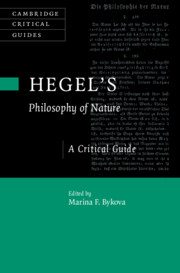Book contents
- Hegel’s Philosophy of Nature
- Cambridge Critical Guides
- Hegel’s Philosophy of Nature
- Copyright page
- Dedication
- Contents
- Contributors
- Acknowledgments
- Abbreviations
- Hegel’s Philosophy of Nature
- Part I Hegel’s Philosophy of Nature in the Historical and Systematic Context
- Chapter 1 The Feebleness of the Concept in Nature
- Chapter 2 Nature and Its Limits
- Chapter 3 Naturphilosophie and the Problem of Clean Hands
- Chapter 4 On Hegel’s Account of Nature and Its Philosophical Investigation
- Chapter 5 The Logic of Nature
- Part II Cosmology, Mechanics, and Physics
- Part III Organics
- Part IV On Contemporary Challenges for the Philosophy of Nature
- Bibliography
- Index
- Cambridge Critical Guides
Chapter 2 - Nature and Its Limits
Hegel’s Idealist Critiques of Physicalism, Naturalism, and Essentialism
from Part I - Hegel’s Philosophy of Nature in the Historical and Systematic Context
Published online by Cambridge University Press: 19 December 2024
- Hegel’s Philosophy of Nature
- Cambridge Critical Guides
- Hegel’s Philosophy of Nature
- Copyright page
- Dedication
- Contents
- Contributors
- Acknowledgments
- Abbreviations
- Hegel’s Philosophy of Nature
- Part I Hegel’s Philosophy of Nature in the Historical and Systematic Context
- Chapter 1 The Feebleness of the Concept in Nature
- Chapter 2 Nature and Its Limits
- Chapter 3 Naturphilosophie and the Problem of Clean Hands
- Chapter 4 On Hegel’s Account of Nature and Its Philosophical Investigation
- Chapter 5 The Logic of Nature
- Part II Cosmology, Mechanics, and Physics
- Part III Organics
- Part IV On Contemporary Challenges for the Philosophy of Nature
- Bibliography
- Index
- Cambridge Critical Guides
Summary
In contrast to what several recent interpreters suggest, Hegel would reject the labels “naturalism,” “essentialist naturalism,” and “naturalist essentialism” for his philosophy. In light of the architecture of his system, the label “essentialist naturalism” would commit him to a variety of physicalism, which he rejects on the grounds of physics’ inability to establish the compatibility of material bodies and physical form. Second, as his critique of nature’s most concrete category “the death of the individual animal” and the sublation of nature into Geist illustrate, Hegel deems nature incapable of reconciling the individuals’ particularity with the genus’ universality, and therefore associates the realm of nature with death and proceeds to sublate nature into the concept of Geist. Finally, pointing out the inability of objectivist essentialist metaphysics to consistently unite the universal with the particular, Hegel also rejects the metaphysics of “naturalist essentialism” and proposes a concept-metaphysical account of the relationship between the logical idea, nature, and Geist. As all of these are variations of the idea, this proves him to be an idealist rather than a naturalist or a spiritualist.
- Type
- Chapter
- Information
- Hegel's Philosophy of NatureA Critical Guide, pp. 36 - 57Publisher: Cambridge University PressPrint publication year: 2024

